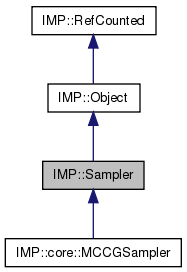A sampler takes a Model and searches for good configurations, given the optimizeable parameters and the scoring function in the Model and extra information that can be provided.
Typically a sampler works by using one or more Optimizer types to search for configurations which minimize the scoring function.

Public Member Functions | |
| def | __disown__ |
| Model * | get_model () const |
| ConfigurationSet * | get_sample () const |
| Sampler (Model *m, std::string name="Sampler %1%") | |
Filtering | |
The set of returned configurations can be filtered on a variety of criteria. | |
| double | get_maximum_score () const |
| void | set_maximum_score (Restraint *r, double s) |
| Set the maximum allowable score for a restraint. | |
| void | set_maximum_score (double s) |
| Set the maximum allowable score for the whole model. | |
Protected Member Functions | |
| virtual ConfigurationSet * | do_sample () const =0 |
| Subclasses should override this method. | |
| bool | get_is_good_configuration () const |
Friends | |
| template<class T > | |
| void | IMP::internal::unref (T *) |
Related Functions | |
| (Note that these are not member functions.) | |
| IMP_SAMPLER(Name) | |
| Define the basic things you need for a Sampler. | |
| bool IMP::Sampler::get_is_good_configuration | ( | ) | const [protected] |
The Sampler can contain a number of filters which limit the set of configurations which are saved. The sampler should check that a state passes the filters before adding it to the returned ConfigurationSet.